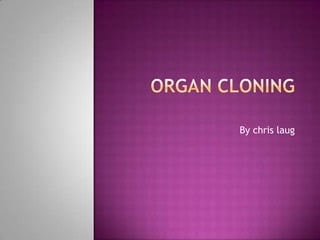
Organ cloning 123
- 1. Organ cloning By chrislaug
- 2. Traits! Individual alleles control the inheritance of traits. Some alleles are dominant, while other alleles are recessive . A dominant allele is one whose trait always shows up in the organism when the allele is present. A recessive allele on the other hand, is masked. Co-dominance , the alleles are nether dominant nor recessive. They use punnet squares to show all the possible outcomes of genetic cross and to determine the probability of a particular outcome.
- 3. Human Genome Project The Human Genome Project stared in 1990 as a coordinated effort between the U.S. Department of Energy and the National Institutes of Health. The Human Genome Project is supervised by ELSI (Ethical, Legal, and Social Implications) program in order to inform the research of updates in the federal rules.
- 4. Ethical – genetic testing of newborns and privacy of genetic code. Legal – the ELSI keeps the human genome project in federal rules so they don’t abuse the research. Social – many people do not think that cloning is a good thing to be doing.
- 5. GINA GINA is the Genetic Information Nondiscrimination Act GINA is a benefit because if a person has cancer genetics in their family they can get medical insurance or a job despite the genetics in their family. GINA makes it so someone who may have the gene and not the disease equal.
- 6. Types of Gene Disorders Single gene disorders – sickle cell anemia, cystic fibrosis, and hemophilia. Chromosome gene disorders – down syndrome Multifactorial disorders – genetic and non-genetic and an example is diabetes.
- 7. Genetic counseling Helps parents to know the chance of a genetic disorder They will help test to see if the parents are carrying a genetic disorder
- 8. Karyotypes Karyotypes are good for telling if you are holding a genetic disorder because it shows the chromosomes that could be a genetic disorder.
- 9. Argument 1 I think organ cloning is a great thing because it will save many people .if every person can cloning there organ I believe that our lifespan will go higher than ever before in the then its ever before. But I think that human cloning is a bad thing because my religion does not believe that two human cant be alike.
- 10. Argument 2 I think that organ cloning is a great thing because they can eliminate donor rejection .organ cloning is also good because children that are born with out out a organ can clone there organs a get what they need.
- 11. Argument 3 I think organ cloning is a good thing because if every got cloned there self they would be alive so much longer. My great grandma died because and see did not get one on time and she died. So if she was able to clone her organs she could be alive so much longer.
- 12. Argument 4 I think that organ cloning is good because if you had kidney caner and you need a kidney you can probably get just one but when you get it and then the other kidney fails you can clone you organs and you will get what you need.
- 13. Conclusion I think that organ cloning is a good thing because they can save many people lives and they should do in the future. But if they do human cloning is to much.
- 14. Work cited Works Cited "Genome.gov | Genetic Discrimination Fact Sheet." Genome.gov | National Human Genome Research Institute (NHGRI) - Homepage. Web. 24 Mar. 2011. <http://www.genome.gov/10002328>. "The Human Genome Project: A Scientific and Ethical Overview (ActionBioscience)." ActionBioscience - Promoting Bioscience Literacy. Web. 24 Mar. 2011. <http://www.actionbioscience.org/genomic/carroll_ciaffa.html>. "The Human Genome Project." Untitled Document. Web. 24 Mar. 2011. <http://campus.udayton.edu/~hume/Genome/genome.htm>. "Multifactorial Disorder - Definition of Multifactorial Disorder in the Medical Dictionary - by the Free Online Medical Dictionary, Thesaurus and Encyclopedia." Medical Dictionary. Web. 24 Mar. 2011. <http://medical-dictionary.thefreedictionary.com/multifactorial disorder>. Padilla, Michael J., Michael J. Padilla, IoannisMiaoulis, Martha Cyr, Elizabeth Coolidge-Stolz, Jan Jenner, and David V. Frank. Science Explorer. Boston, MA: Pearson/Prentice Hall, 2007. Print.